By Manuel “Bobby” M. Orig, Director, ApoAgua
A summary of Run With The Bulls Without Getting Trampled by Tim Irwin
Our work so dominates our waking hours that it’s hard to imagine how we can succeed in life without being successful at work
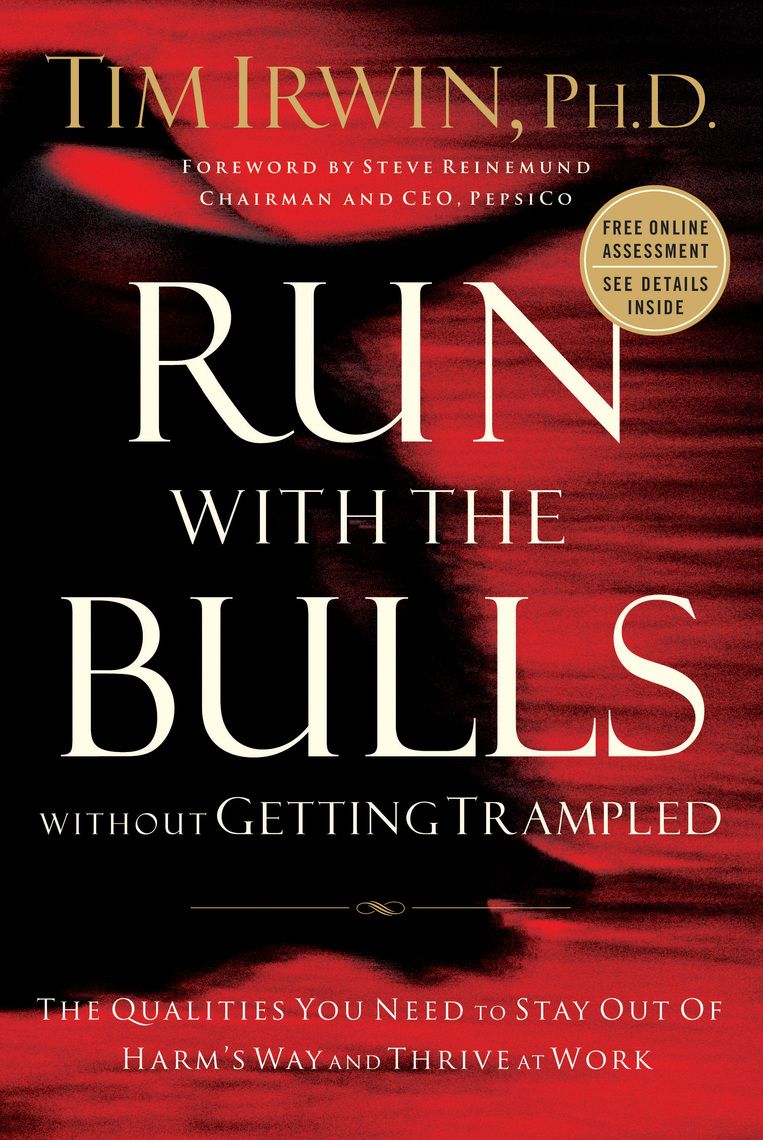
By some estimates, we will spend over 100,000 hours at work during our lifetime. With more than half of our waking hours revolving around work, our means of producing a paycheck has become one of the most dominant dimensions of our lives, absorbing a huge commitment of our life energies.
Unfortunately for so many, our work is not what we relish but rather a major source of pain. Wouldn’t it be wonderful to be able to say at the end of our lives, “My work was worth it – the challenges, the hardships, and the rewards. I invested those years well. I made a difference?”
How can we learn to work this way? In Run With the Bulls Without Being Trampled, veteran corporate psychologist Tim Irwin presents the distilled essence of what makes some succeed and others derail in the workplace.
The author shares the invaluable insights and principles he has gathered from thousands of interviews with senior executives. It presents seven critical success factors for achieving purpose and significance at work and in life. As well as six common career derailers.
This book could very well be your guide to finding lasting fulfillment in your career.
Praise from Marjorie Dorr
Chief Strategy Officer
WellPoint, Inc.
To be effective, strategy must be well executed by great people. Tim Irwin knows what makes people great in the workplace. In my twenty years in the corporate world, Run With the Bulls Without Getting Trampled captures the essence of true success as well as any book I’ve read. What really sets this book apart is how well these principles are conveyed. Irwin’s fresh perspective and personal stories make this a wonderful read!
About the Author
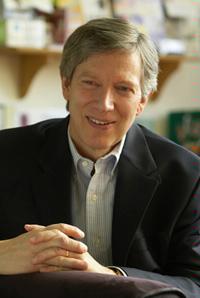
Tim Irwin, Ph.D., has consulted for more than twenty years with many of America’s most well-known and respected companies, including a number of the Fortune 500. He also served in a senior management post for a US-based company with more than three thousand offices worldwide, specializing in organizational effectiveness, talent management, and leadership development. He is a frequent speaker on leadership development and other topics related to organizational effectiveness.
Tim received his A.B. and M.A. degrees from the University of Georgia. His Ph. D. training included a dual major in industrial and clinical psychology from Georgia State University.
He has served on both for profit and nonprofit boards and is currently a managing partner of Irwin Inc., psychologists to business.
Introduction
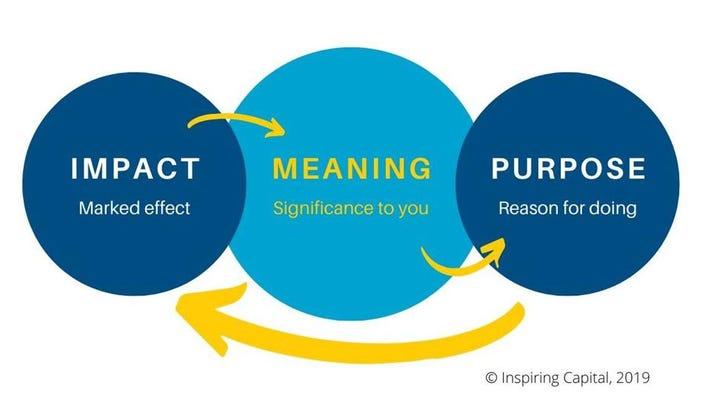
Without question, work is one of the most dominant dimensions of our lives. Most of us spend more than half of our waking hours working. It’s a huge commitment of our life energies, especially when you multiply those many hours by forty, fifty, of even sixty years.
Our work so dominates our waking hours that it’s hard to imagine how we can be successful in life without being successful at work.
Unfortunately for so many, work is not what we relish but rather a major source of pain.
Wouldn’t it be wonderful to say at the end of our lives:
“That’s worth it – the challenges, the hardships and the rewards. I did not randomly careen through forty years of work in confusion and distress. I invested those years well. I made a difference. The many hours I spent at work were successful and significant.”
How can we learn to work this way?
As a corporate psychologist, the author met thousands of leaders and individuals, many of whom were highly successful in their respective organizations, each with their own remarkably individual stories. He also made a career-long study of the relationship between work and the worker.
While experts may not agree in every detail, a fairly broad consensus exists as to what attributes make people effective in their chosen work.
He also learned that many who are judged to be successful are not satisfied – they have not found personal meaning in their work.
Run With the Bulls Without Being Trampled is about personal transformation. It answers the central question: How can you grow to your fullest potential and become someone who will spend those forty years or more until retirement working for meaning, not just for money?
Run With The Bulls

For the author and his son, William, running with the bulls in Pamplona, Spain, was an idea that started one lazy afternoon. William idly mused, “It might be fun to run with the bulls.” They discussed the possibility purely from a theoretical perspective. But over time, their decision making took small incremental steps until suddenly the accumulated momentum swept them into doing something “we would never have considered in a single rational moment.”
Most foreigners know Pamplona simply as “the running of the bulls.” On each of the eight days of the festival, six bulls and six steers are released from a pen at 8:00 a.m. The steers run alongside to calm the bulls in the roaring crowds.
That morning their destination was clear – the arena. The plan was simple, logical, and straightforward: run up the hill to the plaza 100 yards ahead, move over by the fence, let the bulls pass by, and then follow them into the bullring. They would focus on staying out of the bulls’ way and not getting tangled up with any of the half-crazed runners.
By the time the author and his son arrived, the fence which they intended to climb, was seven-deep in people, and there was no sign of an opening. The only thing the author remember is the strong arm of his son, wrapped around his chest to drive him into the crowd along the fence. He had barely time to turn his head to see twelve huge animals with wide, pointed horns zipping by them within spitting distance.
A runner 50 yards ahead was not as fortunate. One of the bulls knocked him over without breaking stride. They were warned that if you fell down, the cardinal rule was to stay on the ground until all the bulls passed by. This young man decided to get up and move to the side. As he stood, another charging bull knocked him down. Incredibly, the same runner tried to stand up one more time! –TV commentators actually gave him high marks for raw courage but low marks for judgment.

In bullfighting they speak of the terrain of the bull and the terrain of the bullfighter. As long as a bullfighter stays in his own terrain he is comparatively safe. Each time he enters into the terrain of the bull he is in great danger.
– Ernest Hemingway, great American Novelist who attended the Running of the Bulls Festival nine times
Running With The Bulls – A Metaphor For Our Lives At Work
Why would anyone in his or her right mind participate in such an event?
The author advance his theory that running with the bulls is a very clear metaphor for our lives at work – a race filled to the brim with challenges, opportunities, and dangers.
The bulls in Pamplona were not out to get the participants of the event. They were indifferent to the people’s presence … unless they got in their way. They didn’t run out of the pen looking for someone to gore, but it is in their DNA to use their horns on anyone encroaching on their space.
The bulls were indifferent to the runners’ hopes and dreams. The bulls’ aggressiveness was simply their nature, and that predisposition only became apparent when they were kept from accomplishing their personal goal – to get out of the bedlam and munch on some nice grain in a quiet place.
The bulls serve as useful symbols for everything that creates the context of our work lives – the events, the circumstances, and the obstacles.
“Bulls” constantly rage around us in the workplace. Inept managers, downsizing, outdated IT systems, ill-designed processes or structures that make our jobs difficult or even obsolete – they are all part of normal organizational life.
An organization’s goals are extraordinarily simple and straightforward – survival and success. And to not meaningfully contribute to these goals or even be irrelevant to the accomplishment of them, automatically puts us in harm’s way.
All organizations constantly seek to achieve their owners’ expectations. Achieving the next quarterly earnings estimates to being able to assure stakeholders that the company will remain in business another year is a nonnegotiable in today’s business environment.
While an effective individual may care about our hopes, dreams, and aspirations, the events swirling in and around an organization do not. The organization’s only focus is achieving its goals, and an organization seeking success and survival will trample us if we do not run skillfully.
Our Work Life Is A Run With The Bulls
Our work life is like running with the bulls as it is replete with both opportunity and danger. Some of us work skillfully, navigating through and around the danger, while others are repeatedly knocked down.
The expression “getting ahead” is a race metaphor that describes how many of us strive to get to a bigger job, with more power, more money, and a more significant title.
We all know of people who are getting ahead, others who are falling behind, and some who never get started. A few run with the organization’s bulls skillfully. They are able to get things done; to work well with a team; to get along with their boss, their peers, their subordinates, and their customers, and to get what they want from the organization.
Others bounce back from company to company or from job to job, unsettled, searching, and constantly in turmoil.
Many people live soap-opera lives, careening from one intense moment to the next, never having really satisfying work relationships. They have problems from the start, fall behind, and become dejected spectators rather than participating in one of life’s great races. More likely, they lacked purpose and direction, compromised their character, or failed to develop the critical competencies so essential to compete in the twenty-first century.
We Are All In A Race
We are all in a race whether we want to be or not. We must run with the bulls skillfully to avoid getting trampled, gored, or repeatedly knocked down. This requires great wisdom and forethought – we must develop a strategic mind-set. We must also run the race with many other anxious runners who are intent on trying to win their own race.
During the half-mile run with the bulls, each runner makes many choices in order to stay out of danger. In many cases, a different choice would have made an enormous difference in preventing an injury. What is especially painful are the people who make the same mistakes over and over, just like the runner who unwisely kept getting up, only to be knocked down by another bull. They refuse to learn from experience.
In the author’s twenty five years of experience of consulting in the areas of leadership development, performance management, and career planning, he observed a pattern. Individuals who build successful careers with purpose and significance, consistently display a pattern of critical attributes.
The author learned that those who succeeded and found significance in their work, regardless of their specific occupation, had these qualities:
- Thoughtful Commitment
- Authentic character
- Exceptional competence
These three qualities are the essential foundational elements of success and significance.
Section 1 Thoughtful Commitment
Significance * Intentionality
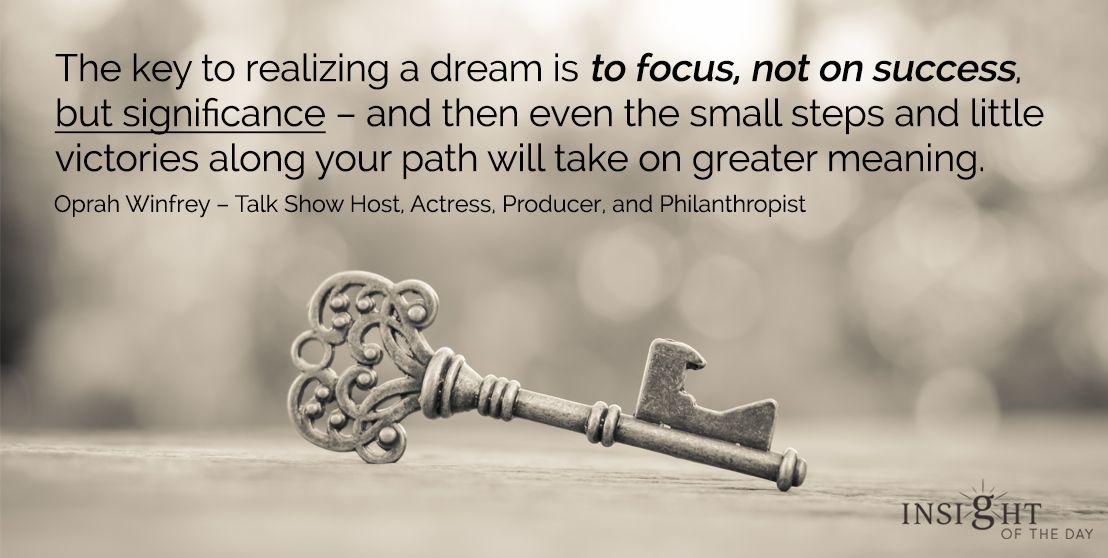
“You did not leave anything on the field – you gave it your all.” Isn’t this what we really want someone to say at the end of our game?
Sometimes a movie, speech, symphony, professor, minister, or even a manager at work awakens that longing for purpose and significance. All of us want to know that at the end of the game, we gave it all in pursuit of high and noble ends…to have a deep sense of significance in our lives.
The following are some of the powerful ways by which we thwart our pursuit of purpose and meaning:
- Complacency
- The dailiness of life
- Conformity – just go along
- Materialism
- Careerism
- COMPLACENCY
Complacency undermines commitment, because we are lulled into a false contentment. We feel self-satisfied, calm, content, and tranquil, but it’s unwarranted. It makes us passive. Our initiative dries up, and we cease taking purposeful steps toward a meaningful end.With a whole life and an ocean of opportunity before them, many frame the boundaries of their planning horizons by what they will be doing two hours from now. Their job is something they muddle through between weekends. It’s so easy to default to a self-satisfied inertia that these individuals never get really clear about where they are doing with their jobs or their lives.
A life of significance requires focus, intentionality, effort, and forethought. Complacency and the resulting passivity keep us from being thoughtful about where we are going in life.
- THE DAILINESS OF LIFE
A primary reason many people don’t pursue a life of significance is that they are too busy providing for themselves and their families. Life is so daily. Getting up and going to work, taking care of a family, having a few friends, and paying the bills are all about most people can handle.For many, living has become more important than life. Whatever dreams they might have had are crushed by the demands of just keeping up.
Typically the biggest challenge in daily life is our job. It’s easy for work to become just a means to an end – just a way to pay the bills. Working this way precludes any opportunity to see a connection between your life direction and what you spend 50 percent or more of your waking hours doing.
A lack of connection between our personal mission and our job often leads us to resent the demands placed on us even by well-managed organizations. We then work like mercenaries, simply paid to do a job with no real commitment to a cause. With this mind-set, it is difficult to see work as a vital and primary means to achieve a life of significance.
- CONFORMITY – JUST GO ALONG
Conformity, one of the most powerful forces in a workplace, can defeat our noblest aspirations. The definitions of normal and correct were what others did. It seemed natural to go with the flow.A life of significance usually requires we paddle upstream against the current of others’ expectations or the organizational norm.
The wolves shown in this New Yorker cartoon are all great at howling at the moon in exactly the same way – they are conforming to the wolf in front. They are all oriented to the moon in just the right way, all howling discordant notes. At the risk of being rejected by the pack (by being a nonconformist), one wolf exhibits the courage to ask the tough question – does what we are doing have any value?
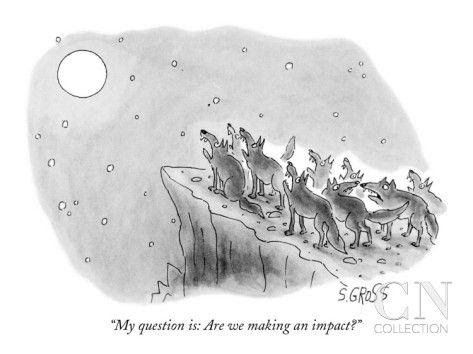
4. MATERIALISM.
Counterfeits often look good but ultimately are proven worthless. The pursuit of money as life’s chief goal is at the top of the counterfeit list. Actually the people who focus on money are not so much in love with money but with what money can buy – power, fame, toys, comfort, and so on.
Gregg Easterbrook wrote in Time magazine:
“There is a final reason money can’t buy happiness: the things that really matter in life are not sold in stores. Love, friendship, family, respect, a place in the community, the belief that life has purpose – those are the essentials of human fulfillment, and they cannot be purchased with cash. chasing money rather than meaning is a formula for discontent.”
5. CAREERISM
Another counterfeit is careerism, putting a career first above all else.
Self-serving, promotion-oriented behavior is at the core of this mentality and advancement is placed above the needs of family, friends, organization, and even one’s best interest such as health.
At the heart of careerism is the idea that a job makes a person significant. What careerists often do not talk about is the price they pay personally. Stories of legendary business leaders often include their undying loyalty to the company and its mission and they sacrifice families and health to advance their career.
Career advancement is a normal, expected result of succeeding in our job. We should take our jobs seriously and, as we grow in our capabilities, larger responsibilities often follow. The problem results when we make the bigger title or more money the sole objective.
Finding Work With Purpose And Significance
A clear distinction of those individuals who achieve great things is that they pursue purpose and significance with their lives.
Finding purpose and significance orders our priorities, how we spend our time, how we raise our children, and how we work.
A question to ask is how do we find purpose and significance in our work? The answer lies in the work that we do and the worker we become.
Investing Our Years Well With Our Job
Our deep yearning for a life of significance should drive us to make our work significant. Because most of us spend more than half of our waking hours working, we need to get it right.
This will only occur if we are thoughtful and intentional in two areas:
- First, on the work that we do, and
- Second, on the person we become at work.
How does a commitment to making our lives guide our decisions about career?
The author cited his father who piloted bombers during World War II, and after the war, he flew commercial aircraft for almost forty years. Despite the many thousands of flights he made over his career, he unfailingly reviewed his preflight checklists before leaving the gate. They were his criteria for ensuring the aircraft was ready for flight. He might encounter unexpected bad weather or have mechanical problems during a flight, but he always knew that he left the airport with a sound airplane.
Our jobs are a prime contributor to a life of significance, but it has to be the right job. What we need is a checklist to help us determine if we are investing our years well with our job.
These are the requirements that should be in our “preflight checklist” to ensure that we are pursuing this right career:

Preflight Checklist 1: Inspires Action
All of us know of people who are miserable in their jobs but are doing nothing about it.
It is tragic that many of us have not found the type of job we can passionately care about. Instead, we find ourselves simply counting the hours until the weekend, anticipating the dreaded Monday morning when we have to go back to work again.
We should regularly ask ourselves:
- Do I have this job to accomplish something significant or simply to have something to do?
- Am I just trying to pay the bills, or am I pursuing a life purpose that my career helps fulfill?
When we show up for work, we should use our energy to pursue our ideals, not dream of retirement. We should all find work for which we have passion.
Preflight Checklist 2: Fits Who We Are
We were created with a unique portfolio of abilities and personal interests. Applying our interests and abilities in the right job is deeply satisfying.
Some people are working for money, not for meaning. They are satisfied with a paycheck and never expect significance from their work.
It is tragic to look back on thirty or more years of work that were neither important nor satisfying.
Preflight Checklist 3: Serves Others
The late Robert Greenleaf, a former AT&T executive, popularized the concept “servant leadership.”
Serving others in the workplace is not a normative organizational behavior and particularly does not fit the image of a strong leader. But Greenleaf was right – effective leaders see leadership as a role from which to serve, not a position in which to be served.
One of the most important ways a leader serves those he or she manages is to help them identify and leverage their strengths. Marcus Buckingham and Donald Clifton, authors of Now Discover Your Strengths discovered from their research, that shockingly, only 20 percent of employees in large organizations felt that their strengths were frequently utilized.
Giving employees more challenging responsibilities to help them discover and develop their strengths have enormous value the employees and the organization.
Preflight Checklist 4: Provides Meaning
One reason so many people are frustrated with their jobs is that they cannot connect what they are doing to a meaningful or lasting outcome. For example, in many jobs, workers don’t often see how their work impacts the customer – they cannot connect action to accomplishment.
In and of themselves, many jobs will prove unfulfilling if they are not viewed as meaningful and connected to a larger purpose.
Meaningful means purposeful, important, substantive, and consequential.
Our work is one of the biggest ways we are remembered. The expression “pride in my work” means that what I have done is an extension of me that may even remain after I am gone…
A prime reason that our work becomes meaningful and endures is because it is “noble.” Aspiring to be noble guides us to a life of significance. Nobility is characterized by high moral character, courage, generosity, honor, and magnanimity.
Given the investment of time and energy that we all put into work, it is critical that we start with the premise that our work must be meaningful and purposeful. It certainly includes what we do, but it also involves the perspective we maintain in our work.
Three masons were laying bricks on a construction project still in the early phase, so it was not clear what was being built. A curious passerby asked each of the workers what they were doing. The first said, “I’m laying bricks.” The second said, “I’m building a wall.” The third said, “I’m erecting a cathedral.” The activities of these three workers were identical, but their perspective was quiet different.
Only the third worker find significance and purpose in his work because of the way he sees his job.
Some people are doing meaningful work, but they need to think about their job differently – to shift their perspective, to find significance and purpose in their work.
Overview of Section 1: Thoughtful Commitment
Our commitments, whether carefully chosen or not, exert great power over our lives. They energize and guide us with focus and intentionality. Thoughtful commitment leads us to pursue a sincere and steadfast purpose with our lives, and it transforms our existence from mundane to extraordinary.
Section 2 Authentic Character
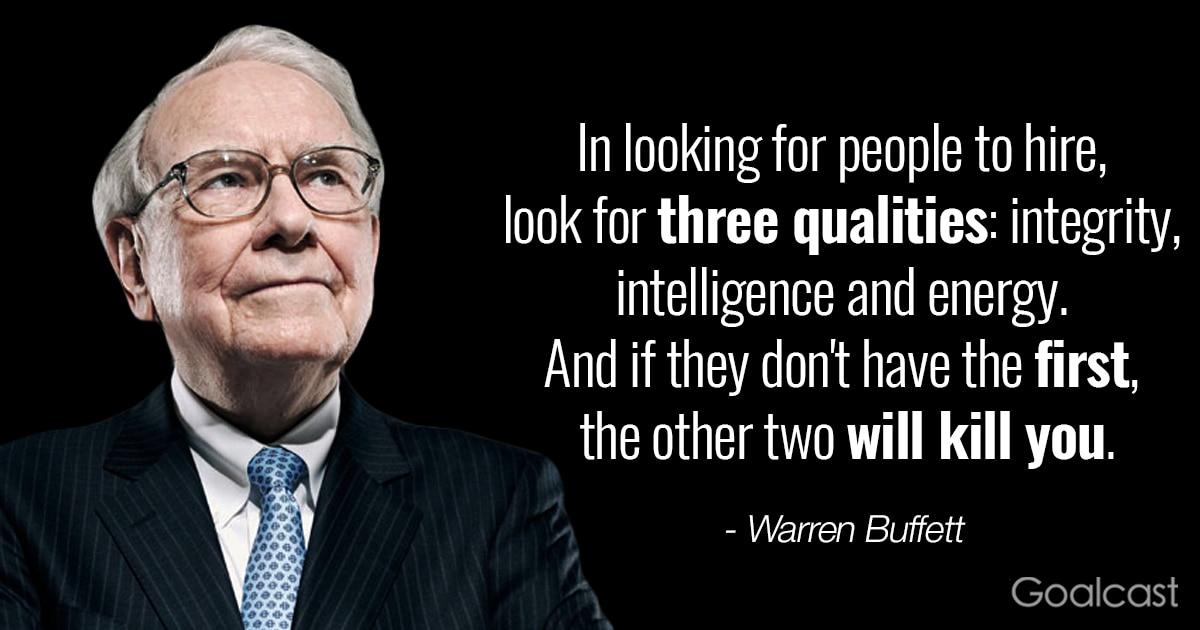
Regardless of our position in an organization, we have significant ethical responsibilities – how we handle expense accounts, use of a company car, use of the Internet, use of sick leave just to name a few. Being thoughtful and self-governing in these areas grows our capacity to keep up with the ethical demands tied to increasing job responsibilities.
We must make sure that our ethical capacity keeps up with our growing responsibilities.
Many enter the workforce with the highest ethical aspirations. Most experienced executives say that in the last decade, there has been a dramatic increase in competitive pressures and an escalation in customer expectations. These and many other pressures wear people down over time.
Without a firm footing of conviction based upon absolutes, alternatives are considered. A compromise never entertained in theory suddenly becomes thinkable in practice…and then doable.
Many of the great war movies are about submarines – The Hunt for Red October, Crimson Tide, Das Boot. Naval officers often refer to the “integrity of the hull” because nothing is more important than the trustworthiness of the hull of a submarine. A compromised hull puts the boat in jeopardy. A trustworthy hull enables the submarine to do its work – to go underwater and complete its mission.
Our humanity makes us terribly fragile, and we are particularly vulnerable in those areas that truly distinguish us, such as integrity.
Compromised integrity impairs performance and our ability to work.
Our integrity or trustworthiness protects us just as the hull of a ship protects the sailors inside. Our integrity enables us to do our work effectively. Any thoughtful person will ask, “Is my personal hull trustworthy, reliable, and structurally sound?”
WHAT IS INTEGRITY… REALLY?
We have all heard a lot of graduation speeches or messages from our CEOs stressing the importance of integrity. But it is easy to get confused about right and wrong. Contributing to this confusion is the fact that so many traditional beliefs have been challenged in media, TV, film, and the courts of public opinion.
Integrity is ultimately a bit abstract – it is sometimes hard to know what we should do in a given work situation.
While we may not know whether an action is right or wrong in every instance, it’s always better for us to choose the harder right instead of the easier wrong.
Why? Because our integrity protects us and guards our reputation.
Many of the moral/ethical issues we face in the workplace seem gray. Ideally, we need guidance that is more concrete and practical.
Trustworthiness is the quality that is really at the heart of integrity. Integrity is the external label for the internal trait of trustworthiness.
If we act in a trustworthy manner, we are more likely to make solid choices in integrity-challenging situations.
Trustworthiness – The Roi Factor
Trustworthiness means worthy of trust.
Whose trust?
In the workplace we are trusted with the assets of those for whom we ultimately work – the stockholders or owners. This includes the company’s money, its facilities, its customers, its reputation, the quality of its products or services, its market positioning, and the well-being of its employees.
Not only do our knowledge, skill, and effort play a huge role in the creation of financial value, but also our trustworthiness creates ROI – return on investment.
The author recently interviewed a senior executive from a Fortune 100 company and asked him, “What is the most important factor in achieving your organization’s business results?” The author expected him to point out their new strategy to aggressively pursue a segment of the retail market. His surprising answer was trust. The executive explained that no strategy would work if people in his company didn’t trust each other.
He further explained that it was the individual and the collective trustworthiness of his team that determines business results.
The author’s analysis showed that one key differentiator between executives who were successful and those who got derailed was their personal trustworthiness – how they handled their time, effort, initiative, and creativity.
Truthfulness
Truthfulness reflects our willingness and ability to be open, candid, sincere, and forthright.
It manifests itself in two ways – with ourselves and with others.
Truthfulness with others is rooted in candor with ourselves.
Be Truthful With Ourselves
It is sometimes very hard to be honest with ourselves, but self-honesty is the cornerstone of trustworthiness.
Our insecurities drives us to subtle forms of self-deception; for example, just think of rationalize as “rational lies.”
The most effective leaders possess great self-awareness. They are always carrying on an honest dialogue about their actions and their motives. This type of honesty allows them to get beyond selfishness and ask what is best for those around them. They possess a magnetic north – a set of principles that they follow to guide them to their decisions.
Be Truthful With Others
Human behavior is complicated, especially when it involves another human. We spend eight to twelve hours or more at work every day, and in that time most of us interact with dozens of people.
Our trustworthiness account balance grows or diminishes through how we treat others in the workplace.
We foster trustworthiness in our relationships with others at work when we communicate honestly.
The linchpin of trustworthiness – always tell the truth. Dishonesty is a seedbed for cynicism and mistrust.
Reliability
When a job has to be done right, corporate managers usually go to the same people for help – they are the ones with positive balance in their trustworthiness account because they are dependable, consistent, and steadfast.
Reliability is a major way to make deposits to your trustworthiness account.
Three actions especially define how we act with reliability in the workplace:
- Keep Your Commitments
To raise the balance in our trustworthiness account, we must do what we say we are going to do. - Pursue Excellence Relentlessly
We must not only do what we say we will, but also do it with excellence. - Run By The Rules
A race work well as a metaphor for our work lives. We should run to win. However, in order for the race to have meaning, it must have rules. And we must play by those rules.
Off The Tracks: Common Derailers
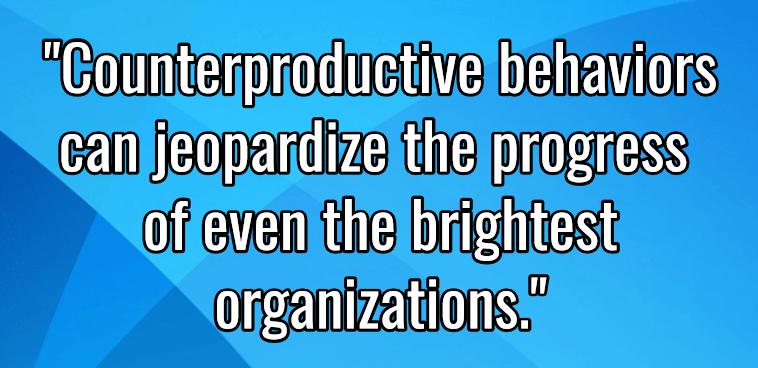
Individuals who derail are usually blinded by their own lack of self-awareness; they miss the connection between their behavior and its impact on others. They have impenetrable blind spots.
Although any number of factors can cause someone to derail, the following are particularly damaging:
- Poor Interpersonal Relationships
Whether with direct reports, peers, managers, or even customers, poor working relationships are often cited as a primary reason for derailment.
Many managers advance because of their technical skills, even when they have major interpersonal deficit. They depend on their technical abilities and fail to develop the skills essential for managing others.
Whether a leader or an individual contributor, these individuals don’t make good team members. They are often out of touch with the needs of others and have trouble working collaboratively.
- Arrogance: A Terminal Case Of Certainty
These individuals overestimate their own capabilities. They don’t adapt well to change they have not authored because they cannot condescend to support a position created by others. Their egos constantly get in the way of their flexibility and objectivity.
Author Jim Collins proposed in his book Good to Great that one of the most distinctive traits of high-performing leaders is humility. These highly effective people are described as modest and calm, yet determined. They rely on inspiring standards rather than personal magnetism to motivate others. They recognize the accomplishments of others and yet hold themselves accountable for poor results.
- Volatility
These people are often moody and hard to please, and their excessive emotionality and hair-trigger tempers make coworkers steer clear of them. No one likes to work for this kind of manager.
Volatile managers sometimes play a psychological game called “uproar”: they get their way by keeping others off balance. After getting their way they immediately calm down. Employees learn where the emotional landmines are and avoid bringing up these subjects even when the work suffers as a result.
- Aloofness
This is the tendency to be uncommunicative. People who act this way are usually critical and demanding. Their aloofness is rooted in an introspective style that makes them detached, insensitive, and dismissive of others.
Shortly after Robert Goizueta died, the board of Coca Cola Company appointed M. Douglas Ivester as chairman and CEO. He was a logical choice for the role: formerly chief financial officer of Coke, Ivester had assisted Goizueta in creating Coca Cola Enterprises, a separate company created to consolidate many privately owned bottlers of Coke products.
Because Ivster was so strong in the financial and accounting functions, his strengths as CFO became weaknesses as a CEO. Coke suffered a huge firestorm when Coca Cola products in Belgium were found to be contaminated. Ivester and his team handled the PR nightmare with frustrating slowness, and stock values quickly eroded under their tentative approach.
The Wall Street Journal described Ivester as having a “tin ear.” He did not pick up on subtle messages from the people around him and was insensitive to nuances. The general clumsiness Ivester displayed in addressing the crisis reflected an overall leadership deficit – aloofness and an inability to read other people and situations.
This resulted in slowness to act and a disastrous error in public relations.
- Failure To Achieve Results
High achievers do whatever it takes to get results and often show great resourcefulness.
In contrast, those who derail don’t make sound decisions and fail to take the necessary actions to create strategic alignment with other groups. They don’t follow through on actions they have agreed to take and communicate poorly what others must do to achieve good outcomes. Their failure to build and motivate a team around common goals inevitably leads to poor performance.
Ultimately, our jobs are about achieving results that are important to the organizations that employ us. One way of being wise at work is to find out what our bosses value. Metrics have become a consuming focus of the modern organization. It is wise to know what standards our bosses view as important and make sure our energies at work are directed at achieving those metric goals.
- Inability To Change
As members of an organization move to higher levels or different departments or organizations, their skills must change. They must be flexible enough to learn new approaches that match the needs of the new situation.
Leaders who derail often fail to adapt. When they enter a new department or a new organization, they rely too heavily on methods or models they have used in the past. Unfortunately, these tried and true methods don’t always translate.
Ultimately, these derailers are failures of character, to which we are all vulnerable.
Overview Of Section 2: Authentic Character
Our character ultimately defines who we are. We explored the broad composition of character, including integrity and persistence, along with the factors that cause us to derail in our careers. Our character wraps around us, protecting us like the hull of a submarine – but compromises in our hull can be exposed by routine pressures of the workplace. Compromises take the form of dishonesty with self and others but are also found in arrogance, volatility, and poor interpersonal relationships. An authentic character makes us worthy of trust.
Section 3 Exceptional Competence
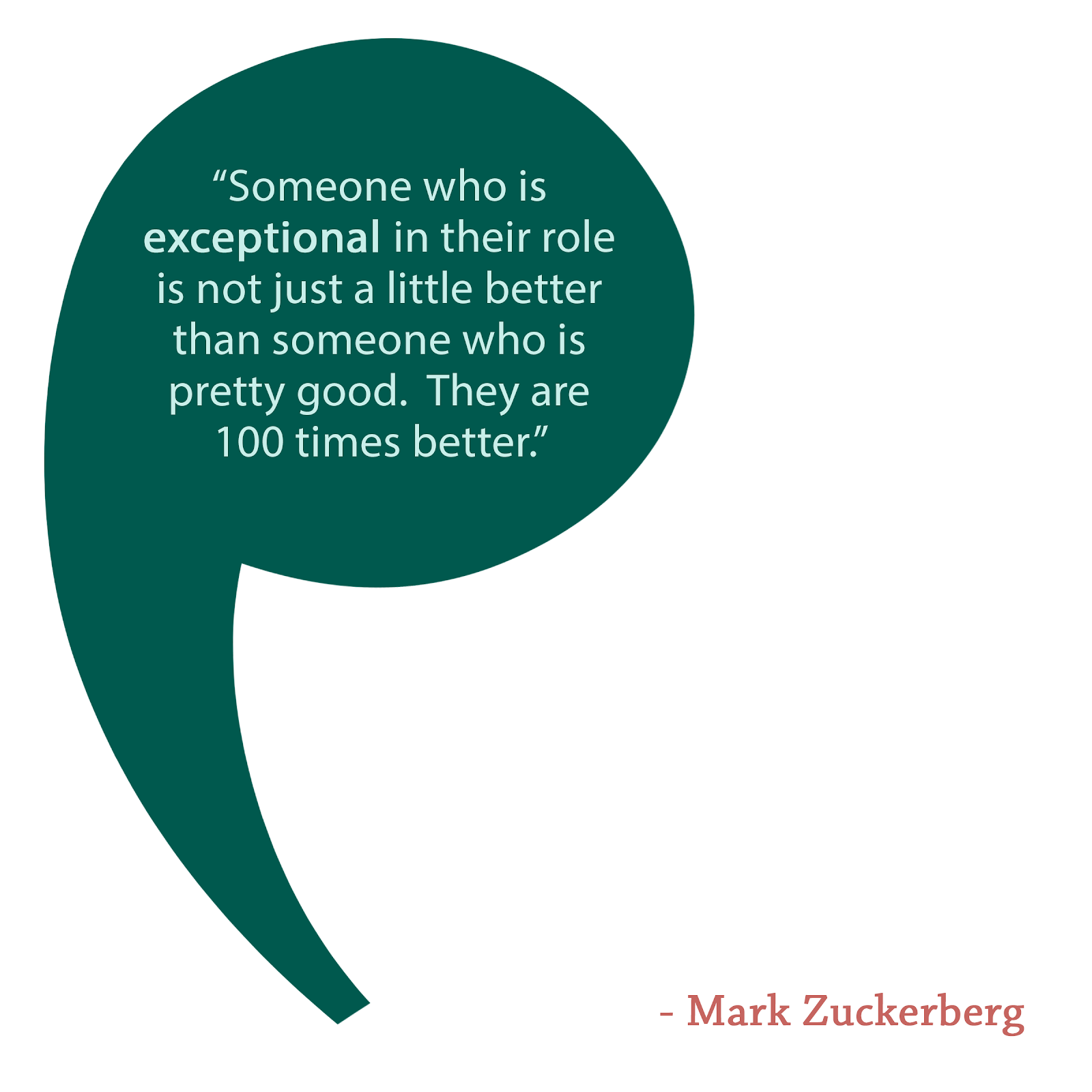
We all know people who are skilled at the art of living. They always seem to know what to say, what to do, and get themselves out of bad moods quickly.
These individuals are also usually wise at work.
- People like working for them;
- They work well on teams and always seem to know the best way to get something through the system.
- They have great self-management, good judgment, interpersonal effectiveness.
- They tend to be more skilled in teamwork, collaboration and conflict management.
Undoubtedly, we know of others who constantly stumble.
- They don’t often get the results their organization needs.
- They don’t seem to learn from their mistakes;
- They tend to deflect feedback that is so necessary to improve at work.
Critical Success Factors

Competence – our ability to perform effectively in the work setting – is in large measure a product of skills and seven Critical Success Factors (CSFs).
Both skills and CSFs are essential for those who aspire to achieve exceptional performance in their work.
Skills make us competent for specific jobs such as selling, managing, accounting. However, skills alone are not sufficient to achieve exceptional performance.
We have all seen people who are exceptionally skilled and yet fail to achieve larger success in the work setting. Most of those individuals are deficient in one or more of the seven Critical Success Factors.
Universal in nature, CSFs undergird the use of our skills and are essential to excellent performance in all jobs. Skills gets us into the race, CSFs help us win it.
The author’s experience with thousands of individuals in the workplace convinced him that mastering the seven CSFs is nonnegotiable for success.
Fortunately, these seven CSFs can be developed:
- Self Management
- Relationship Management
- Forethought
- Dependability
- Resourcefulness
- Ability to Learn
- Ability to Change
Critical Success Factor 1: Self Management
Individuals who are smart have a high intelligence quotient or IQ. They can solve complex problems and are logical.
On the other hand, individuals who are effective at living have high emotional intelligence or EQ.
People with high EQ have:
- the ability to manage one’s self,
- effectively relate to others,
- effective at controlling their impulses,
- effective at managing the stress that can compromise moods and diminish empathy for others.
In a cover story on emotional intelligence, Time magazine looked at the IQ and EQ of different US presidents. Jimmy Carter is high on the IQ scale while President Ronald Reagan is thought to be above average but not at the top.
Although Carter’s IQ is higher, he had trouble relating to his constituents – an EQ problem. Carter had a dour personality and often frowned.
By contrast, many people admired Reagan. He communicated in soaring themes that inspired Americans to believe in themselves. Reagan had a cheerful, upbeat personality, and he is almost always smiling. Clearly, Reagan’s EQ made him an endearing leader.
Having recognized that IQ is not the sole determining factor in effectiveness, researchers had focused more on the emotional intelligence of high achievers.
An important adage has emerged in the workplace: “IQ gets you hired … EQ gets you promoted.” To get in the door we have to demonstrate some level of mental capacity (IQ), but once hired, the ability to manage our own behavior and our relationship with others (EQ) will have greater impact on our success.
Critical Success Factor 2: Relationship Management
Despite technology, virtual offices, and new ways of getting work done, the workplace is more interdependent that ever. No matter what size organization we work for, we must work with others, and our ability to work well with others has a gigantic impact on how well we do our jobs.
Relationship management is a major key to effectiveness in the workplace. Being wise at work requires that we learn to work effectively with others. Skillful relationship management relies on the influence gained from knowing people, understanding differences, and recognizing conflicting agendas.
Competence spans not only the accomplishment of the task but also how you collaborate with others in the accomplishment of that task. Working on a team, managing conflict effectively, and influencing others can spell the difference between success and failure in today’s workplace.
Critical Success Factor 3: Forethought
A 60 Minutes interview featured Tom Brady, the sensational quarterback, who at age twenty eight had already won three Super Bowls. When he was asked what’s the secret to his success, his answer was Forethought.
Brady spends a tremendous amount of time preparing for the team’s next game. He watches game films to visualize how his next game will unfold. The actual game is simply the execution of the plan already in his head. He told the interviewer: “It’s not like you go out there and wing it … you try that and you’re going to get hit.”
Unfortunately, we sometimes wing it with predictable results – we get hit.
The author cited an experience wherein he was asked by his staff member if he would meet with her and a client to discuss the client’s service need. The date was four months out, so he agreed and then forgot about the meeting.
On the day of the meeting, the author touched base with his staff member and they walked through their strategy for the meeting. About halfway through the meeting the prospect began to ask questions that implied a certain level of forethought. The prospect asked if they have read the autobiography of the founder of his company, or if they had read recent analyst’s reports evaluating their new strategy. They had not and the prospect nailed them. How could the prospect take them seriously if they have not done their homework?
Competence depends upon forethought – careful anticipation of what is needed to produce a good outcome.
Wise workers are always looking ahead to identify possible problems or opportunities that can either hurt or help their efforts.
Critical Success Factor 4: Dependability
The author encourage organizations to create “ownership cultures.”
Fostering an environment in which employees “own” the company’s mission, strategy, and goals profoundly affects productivity – even more so when employees own their jobs and accept responsibility for making the organization successful.
Most employees want to excel at their jobs and want their organization to prosper, but management sometimes makes this kind of emotional ownership difficult. As a result, some companies workers do as little real work as possible.
Dependable individuals plan, organize, and finish their projects. They follow through – you can rely on them to get things done. They are purposeful, determined, and have very high standards. They regularly communicate essential information about the status of a project or customer order, explaining what still needs to be done, by whom, and when. When they blend their initiative and dependability with good interpersonal relationships, they are powerhouses of productivity.
Critical Success Factor 5: Resourcefulness
Organizations desperately want resourceful employees. Individuals with this critical skill always seem to find a way to solve problems and to get the job done.
When we are resourceful, we solve problems and deal effectively with difficult problems. We accept responsibility to understand the nature of the problem and what is needed to resolve it. The resourceful person uses imagination to marshal assets to reach an important goal.
A manager finds it incredibly refreshing when an employee discovers a problem and then exercises initiative to address it in a capable way before the manager even knows it.
There will always be problems as Murphy’s Law predicts. Customers change their minds at the last minute, machinery breaks down, and bad weather creates havoc. Being resourceful means we step up and find an innovative way around these obstacles. We take the initiative and use our wits and creativity to create new solutions.
Those who fail in such situations usually see the unexpected problem as an excuse rather than a call to greater levels of initiative, effort, and creativity.
Critical Success Factor 6: Ability To Learn
To excel at work we must learn continuously and become smarter every day. When we are in school there are valuable skills that are important to master, but the most important skill is to learn to learn. Even the sharpest blade gets dull with use; learning is the best tool for sharpening your mind.
Active learning is always preferred to passive learning. To learn actively we have to gather, understand, and apply information rather than letting it act on us.
The best sources of new insights are our experiences. We especially need to learn from our successes and failures.
The most important part of learning is doing something with it – applying what we have learned for the next time it is relevant. It is the skill that enables us to see past an experience to the broader significance of the event. To have the experience and not miss the meaning.
The first six Critical Success Factors – self-management, relationship management, forethought, dependability, resourcefulness, and the ability to learn – require a lifelong focus of disciplined intentionality.
Critical Success Factor 7: Ability To Change
The seventh CSF, ability to change, is how we develop and sustain the first six CSFs.
It requires personal transformation. As with most things in life, going downstream requires so little energy that we are naturally drawn in that direction. Transformation requires that we marshal the resources to go upstream. The payoff is increased effectiveness and the achievement of success and significance, regardless of what type of work we do.
Why are New Year’s resolutions so transient? Why is it that some people seem to make change happen while most don’t? Blame them on people’s inability to change.
Personal transformation is the most difficult challenge in life. Some people seem to adopt personal change and become different. They lose weight and keep it off. They raise their EQ. They take purposeful steps to increase their technical skills.
For others, change remains a pipe dream. Its imagined but never realized.
How do successful change happen?
The key to transformation is in understanding and then harnessing the forces at play in our lives. We typically experience some forces pushing toward change while other forces resist change. It is critical that we understand these forces and learn to use them. It is also essential that we understand what it takes to sustain them.
Many organizations utilize multi-rater questionnaires to develop their employees. This 360-degree feedback typically asks a person’s manager, peers, and others to rate him on a variety of competencies. A report summarizes his performance and is particularly effective at identifying blind spots. The results of this feedback are often contradictory, eye-opening, and catalytic.
A colleague of the author’s client reacted so strongly to his 360-degree feedback report that he overturned a table and stormed out of the room. He and his raters had strikingly different perceptions of his effectiveness.
When we experience this wake-up call, we react in one of two ways. We either affirm the information by reflection and possible action, or we deny that it’s true.
Affirmation lets us thoughtfully consider the feedback we have received.
While denial insulates us and deflects the feedback away from us. We claim to be misunderstood and the victim of misperceptions – “I’m not really that way,” “I’ve changed,” “No one understands me.”
This stage is truly the moment of truth, because at this point we either lapse back into our comfort zone of familiarity or we decide to take the next step of change.
If we accept feedback, a 360-degree exercise or other sources, we can consider what changes to make and how to make them.
When we don’t accept the feedback, we deny ourselves the potential benefits of personal transformation.
Overview Of Section 3: Exceptional Competence
The seven Critical Success Factors make us truly competent regardless of the work we do. Despite personal brilliance and a vast array of technical skills, we fail to perform effectively at our jobs without these seven CSFs – self-management, relationship management, forethought, dependability, resourcefulness, an ability to learn, and an ability to change.
Effectiveness in these seven attributes leads to exceptional competence.
Conclusion

We live in a world filled with challenge and uncertainty. We run with the bulls every day, and that’s unlikely to change. What we can change is how we run the race.
Helen Keller, who despite her blindness since the age of nineteen, became a famous author, educator and disability rights advocate said that “life is a great adventure, or it’s nothing at all.”
The author’s hope is that every day you will find significance in your work and that you will discover a grand adventure.
A life dedicated to the pursuit of high and noble ends is not an easy life, but it is filled with adventure and fulfillment that cannot be experienced any other way.
Given the huge role that work plays in our lives, he hopes that in the end you will feel that you invested all those years well, and when you go to bed at night, you will never wonder why you are in this planet.
University of Experience is a special Aboitiz Eyes section that focuses on leadership insights from the unique experiences, perspectives, and wisdom of leaders who have stood at the helm of Aboitiz over the years.
If you enjoyed this article, would like to suggest a topic, or simply share your feedback, please CLICK HERE.

